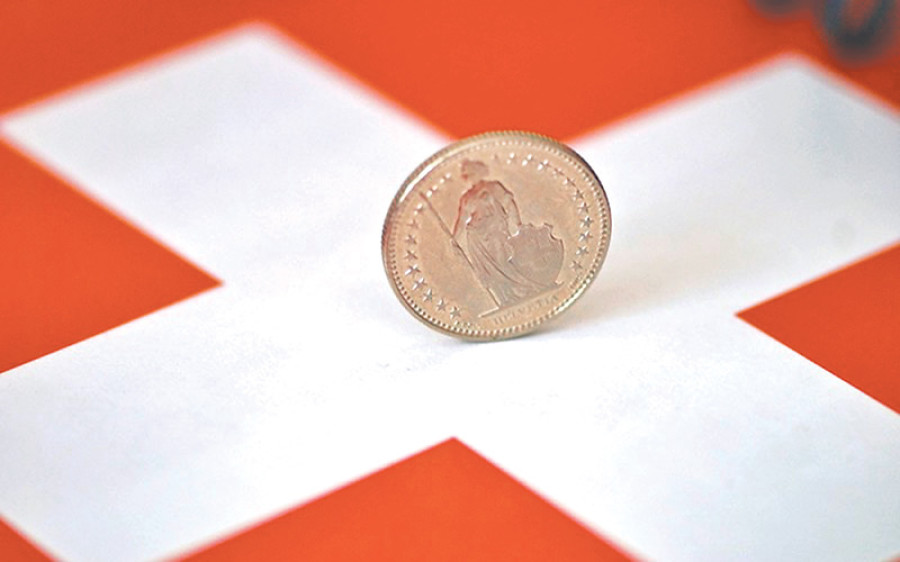Opinion
Swiss dreams
Nepal too is located between giant economies, but it has remained poor for centuries
Pawan Roy & Saurav Raj Pant
Switzerland has a highly specialised export economy consisting of banking, finance and tourism. Its neutrality is known globally. The two greatest features of Swiss foreign policy are neutrality and trade. Following this guideline, Switzerland developed rapidly, and today it is the most innovative European power with a high GDP and per capita income. Switzerland’s GDP is $664.7 billion and its population is 8.2 million (Nepal’s GDP is $20.8 billion and the population is 28.5 million). It has an area of 41,285 square kilometres, which is about two-thirds the size of Nepal. According to the Global Innovation Index 2016 developed by the World Intellectual Property Organisation, Switzerland tops the list of the most innovative countries followed by Sweden and United Kingdom.
How Switzerland achieved such enormous economic growth is a topic of debate and there is no perfect answer. Daron Acemoglu and James Robinson famously mentioned in their book Why Nations Fail that economic and political institutions need to be inclusive, but it is not definitive. Switzerland’s economic prosperity was inherited in the historical evolution process, and it is also due to political stability, direct democracy and neutrality. Nepal has just started discussing inclusiveness and participatory democracy.
The watch industry which emerged in the 17th century in Geneva and the Jura Mountains, and the textile industry which developed in St Gallen and Zurich were the key industries during Switzerland’s early industrialisation period. The development of railroads facilitated exports of Swiss goods to immediate large neighbours Germany and France, which turned Switzerland into one of the key trade players in central Europe. During World War II, Switzerland ran into controversy because of its trade with Nazi Germany and tight asylum policy against Jewish refugees. Switzerland traded gold with Germany and earned huge profits.
Swiss foreign policy can’t be analysed without analysing its trade policy. Switzerland has made strong financial and economic institutions. Neutrality made Switzerland a safe harbour for keeping overseas funds. Because of its neutral position with the global super powers, none of the countries could attack it. This allowed the Swiss to focus on internal politics resulting in political stability. Political stability in turn gave them economic sustainability. Maintaining strong neutrality depends on national interest which is directly linked with stable politics. National interest is directly proportional to the foreign policy of any country. In Nepal, there is no consensus regarding our national interest. Nepal’s nation building process in the last 65 years was entangled in an ideological dilemma: What is the right ideology to govern the country? Right, left or centre?
Nepal’s 65 years of struggle taught us that economic prosperity isn’t the epicentre of any political manifesto. The traditional powers always wanted to retain their strength, and political parties always wanted to gain control. This paradox of two working styles (gaining and retaining supremacy) dragged Nepal into a deep conflict of inequality, corruption and bad governance. Nepal is the oldest nation-state in South Asia, yet it is having a gloomy time surviving between two giant neighbours. Switzerland also experienced similar fear in its history, but it succeeded. Its success is the result of strong national consensus, definite foreign policy and heavy profits gained from overseas trade.
Switzerland is bounded by Austria and Liechtenstein in the east, Germany in the north, France in the west and Italy in the south. Germany, Italy and France are members of G7, a group of seven highly industrialised countries representing 64 percent of net global wealth. Nepal is bounded by India in the east, west and south and by China in the north. India’s GDP is $2 trillion and China’s GDP is $10.8 trillion. Germany, France and Italy are respectively the fourth, sixth and eighth largest economies in the world. Closer to home, China is the second largest economy and India is the seventh largest economy in the world. Nepal should obtain benefits from both its immediate neighbours on equal terms.
Nepal’s foreign policy is based on Panchasheel which is basically a non-aligned or neutral policy. However, we haven’t been able to properly benefit from this neutrality compared to Switzerland. There are many rational opinions regarding why Nepal hasn’t been able to benefit from its neutrality. The anomaly of our national interest made us more flexible towards the southern neighbour. Such tilting wasn’t done after rigorous analysis but with ‘mob’ brains. Despite being landlocked, Switzerland has become the world’s 19th largest economy. Nepal, also a landlocked country, has remained impoverished for centuries. The question remains. Would it be daydreaming to expect Nepal to benefit like Switzerland?
Roy is an international relations student at TU; Pant is a development consultant




 11.12°C Kathmandu
11.12°C Kathmandu











